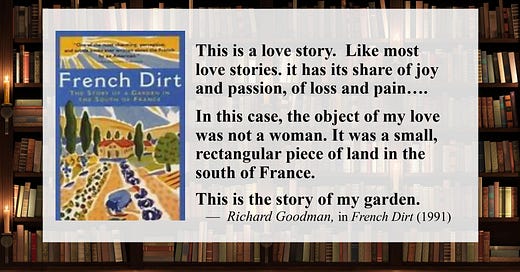Dr. Mardy's Quotes of the Week ("Gardens & Gardening")
May 19—25, 2024 | THIS WEEK: “Gardens & Gardening”
Opening Line of the Week
These beautiful opening words come from the book’s Prologue, and it’s almost impossible to imagine a reader not wanting to read on. Shortly after the book was published, a review in The Midwest Book magazine paid the author—a writer and university professor, not a professional gardener—the supreme compliment, writing:
“Goodman i…
Keep reading with a 7-day free trial
Subscribe to Dr. Mardy's Substack to keep reading this post and get 7 days of free access to the full post archives.



